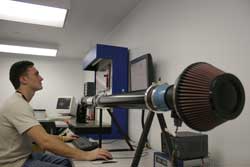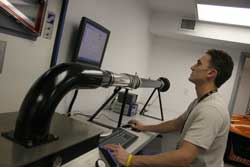K&N Reveals Mass Air Flow Sensor Urban Myths
- Aug 31, 2006
There are four words from a mechanic that should trigger a red flag for
consumers, Mass Air Flow Sensor. A little knowledge about this “mystery” sensor
can save hundreds of dollars and protect car warranties.
If a mechanic or dealership claims excess oil from a K&N Engineering Lifetime Air Filter caused a Mass Air Flow sensor (MAF) failure, it’s not true. K&N has researched, tested and devoted many hours to confirm the use of K&N Air Filters, including over oiled air filters, will not cause a Mass Air Flow sensor failure under any remotely normal driving conditions.
Oil does not come off K&N Filters. If a mechanic or dealership claims K&N is the problem there has to be proof. K&N will often work with consumers to recover money for repairs which legitimately should have been covered under the vehicle’s warranty where warranty coverage would otherwise have been available.
“We’ve tested Mass Air Flow sensors and discovered these parts are being replaced when they don’t need to be,” said K&N Senior Lab Manager Rich Dwyer. “Consumers are sometimes told readings from the Mass Air Flow sensor show it is saturated with oil from a K&N Filter. This is not true. Consumers should ask to see the Mass Air Sensor codes and/or get a second opinion.”
In a period where K&N sold more than 5 million filters, 52 sensors were evaluated. Not one of these suspected MAF sensors sent in for laboratory evaluation were shown to have failed because of contamination from K&N filter oil. In fact, 28 sensors were in perfect operating condition. K&N helped those consumers recover money for unnecessary parts and labor.
The other 24 sensors failed due to factors not related to K&N. There were traces of silicone potting compound which is used in the manufacturing process of MAF sensors, meaning the MAF sensor contaminated itself. There was also evidence of motor oil contamination from blow-by; a condition where oil vapor from combustion is re-circulated into the vehicle’s intake tract.
“A lot of dealerships do not have the ability to test MAF sensors,” said K&N Vice President of Product Development and Engineering Steve Williams. “If you’re going to diagnose something you should show whether it is at fault or not. What they have is what we call the plug and play process. That is where they go through and download some codes and guess. The consumer then gets hit with a bill for components that were never a problem. K&N always tells people the facts.”
There is no silicone in K&N oil and testing has shown that MAF sensors will operate normally after being immersed in K&N Filter oil.
“Who is in a worse position than a consumer who has taken their car into a shop and told this is what you have to do to get your car back on track?” asks K&N CEO Steve Rogers. “Consumers have rights and information is power, no one needs to be taken advantage of.”
K&N is also committed to working with its dealership network and notes that most dealerships provide excellent service and fulfill car warranty obligations without issue, argument or tardiness. K&N is also committed to communicating with its customers and fully disclosing all information about this issue.
K&N encounters less than 200 dealership problems annually, which is very small compared to the number of filters we sell annually (2,500,000), and we treat each situation as if it were our own personal problem.
If you encounter a similar problem related to K&N Filters at your dealership, contact us immediately and allow us to communicate with the dealership on your behalf. K&N has had great success in working with dealerships to resolve these types of issues on behalf of our customers. Many dealerships sell and service K&N Air Filters and we encourage you to work with those dealerships.
“K&N wants to dispel a dealership myth that in some way problems with the ‘mystery’ sensor or Mass Air Flow sensor is tangled with K&N products,” said Williams. “The average consumer does not have a prayer to be able to decided what is true or not. K&N will stand behind our products and go to bat for our consumers.”
For more information about MAF Sensors go to the K&N Mass Air Flow Sensor page.
Find K&N products for your vehicle using the K&N application search then use the K&N dealer search to find a K&N dealer in your part of the world.
If a mechanic or dealership claims excess oil from a K&N Engineering Lifetime Air Filter caused a Mass Air Flow sensor (MAF) failure, it’s not true. K&N has researched, tested and devoted many hours to confirm the use of K&N Air Filters, including over oiled air filters, will not cause a Mass Air Flow sensor failure under any remotely normal driving conditions.
Oil does not come off K&N Filters. If a mechanic or dealership claims K&N is the problem there has to be proof. K&N will often work with consumers to recover money for repairs which legitimately should have been covered under the vehicle’s warranty where warranty coverage would otherwise have been available.
“We’ve tested Mass Air Flow sensors and discovered these parts are being replaced when they don’t need to be,” said K&N Senior Lab Manager Rich Dwyer. “Consumers are sometimes told readings from the Mass Air Flow sensor show it is saturated with oil from a K&N Filter. This is not true. Consumers should ask to see the Mass Air Sensor codes and/or get a second opinion.”
In a period where K&N sold more than 5 million filters, 52 sensors were evaluated. Not one of these suspected MAF sensors sent in for laboratory evaluation were shown to have failed because of contamination from K&N filter oil. In fact, 28 sensors were in perfect operating condition. K&N helped those consumers recover money for unnecessary parts and labor.
The other 24 sensors failed due to factors not related to K&N. There were traces of silicone potting compound which is used in the manufacturing process of MAF sensors, meaning the MAF sensor contaminated itself. There was also evidence of motor oil contamination from blow-by; a condition where oil vapor from combustion is re-circulated into the vehicle’s intake tract.
“A lot of dealerships do not have the ability to test MAF sensors,” said K&N Vice President of Product Development and Engineering Steve Williams. “If you’re going to diagnose something you should show whether it is at fault or not. What they have is what we call the plug and play process. That is where they go through and download some codes and guess. The consumer then gets hit with a bill for components that were never a problem. K&N always tells people the facts.”
There is no silicone in K&N oil and testing has shown that MAF sensors will operate normally after being immersed in K&N Filter oil.
“Who is in a worse position than a consumer who has taken their car into a shop and told this is what you have to do to get your car back on track?” asks K&N CEO Steve Rogers. “Consumers have rights and information is power, no one needs to be taken advantage of.”
K&N is also committed to working with its dealership network and notes that most dealerships provide excellent service and fulfill car warranty obligations without issue, argument or tardiness. K&N is also committed to communicating with its customers and fully disclosing all information about this issue.
K&N encounters less than 200 dealership problems annually, which is very small compared to the number of filters we sell annually (2,500,000), and we treat each situation as if it were our own personal problem.
If you encounter a similar problem related to K&N Filters at your dealership, contact us immediately and allow us to communicate with the dealership on your behalf. K&N has had great success in working with dealerships to resolve these types of issues on behalf of our customers. Many dealerships sell and service K&N Air Filters and we encourage you to work with those dealerships.
“K&N wants to dispel a dealership myth that in some way problems with the ‘mystery’ sensor or Mass Air Flow sensor is tangled with K&N products,” said Williams. “The average consumer does not have a prayer to be able to decided what is true or not. K&N will stand behind our products and go to bat for our consumers.”
For more information about MAF Sensors go to the K&N Mass Air Flow Sensor page.
Find K&N products for your vehicle using the K&N application search then use the K&N dealer search to find a K&N dealer in your part of the world.












